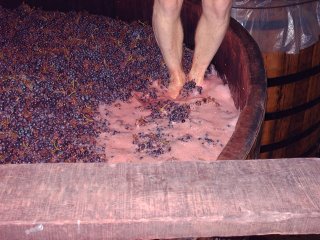Eco-credentials are the new black. Everyone is ardently declaring their good intentions in saving the environment. Email sigs now have the obligatory admonishment not to print out unneccessary emails, companies are looking at their carbon footprints and in some cases taking measures to "offset" or compensate for it. But what can a hotel do, or a restaurant?
Recycling is a start - we recycle glass and cardboard - obviously we use loads of glass - wine bottles, beer bottles, soft drink bottles and hundreds upon hundreds of mineral water bottles. Which brings me to an interesting point. In America, particularly San Fransisco and New York there has been a big trend recently towards shunning mineral water in favour of Tap Water. America has had this obsession with a particular brand of water - Fiji Water, suposedly one of the purest and cleanest mineral waters available. But a recent article in Fast Company magazine shows that environmentally Fiji water is perhaps the most unfriendly product. http://www.fastcompany.com/magazine/117/features-message-in-a-bottle.html. (thanks to http://www.boingboing.net/2007/07/02/what_it_takes_to_bri.html) It makes for some quite scary reading really. But it doesnt just apply to mineral water.
One of the big awareness issues of the moment is the number of "food miles" that your ingredients have travelled to get to your kitchen. Now for many restaurants that use local produce this is quite low and hence environmentally friendly. But if your restaurant is serving asparagus in March it is highly likely it has been flown in from Peru. And here we come to a crucial issue in menu design and planning. In order to be environmentally friendly as a restaurant, you must first support your local producers, but you must also change your menu more frequently to use local seasonal produce. British Asparagus is only in season for some six weeks, so to truly promote your green credentials it ought to only be on the menu for about the same length of time. The British Strawberry season is similarly short - particularly when June has been as wet it we have had, yet customers expect strawberries and cream with their afternoon teas all year round. This means we are serving Israeli, Dutch, Spanish, Peruvian, and any other country that grows them to meet a demand. And here we meet the crucial dillema that restauranteurs face - be green or keep your customers happy. Maybe we are going to have to be a bit forceful and hope that our efforts at being green will deflate any complaints (not likely!) This is only the beginning really. As a restaurant we consume a huge amount of resources - electricity, gas, heating - a huge bugbear of mine is when a single customer sits down and within ten seconds starts demanding the heating turned up because they are cold, never mind the other twenty people sat in the restaurant who are fine. As the heating is located in the basement and takes a good half hour to heat up the restaurant (its a big room!) I reckon that is uses loads of energy to heat up the retaurant by one degree. When does it become bad customer service to try and conserve energy and resources?
At the moment the industry is playing at being environmentally friendly, not for lack of will on our part- but mainly through lack of support from customers. We can be more environmentally responsable, but we need the customers to back us up and perhaps change their expectations. But as many people will soon strive to change their livestyles to become more eco-friendly then they will change their expectations of the services they use - shops, restaurants, hotels etc. But by then it will probably be too little, too late.
Tuesday, July 03, 2007
Subscribe to:
Post Comments (Atom)





No comments:
Post a Comment